Crime and punishment in the wildlife trade - WWF UK
Crime and punishment in the wildlife trade - WWF UK
Crime and punishment in the wildlife trade - WWF UK
Create successful ePaper yourself
Turn your PDF publications into a flip-book with our unique Google optimized e-Paper software.
goods <strong>in</strong>volved can be liable to forfeiture 103 . In <strong>the</strong> case of <strong>wildlife</strong>, CEMA provides two<br />
avenues for punish<strong>in</strong>g offenders. Penalties may be imposed for import<strong>in</strong>g goods that are subject<br />
to restriction or prohibition, provided that <strong>the</strong> person had <strong>the</strong> <strong>in</strong>tent to evade <strong>the</strong> restriction or<br />
prohibition 104 . O<strong>the</strong>rwise, <strong>and</strong> more commonly, sections 170 (1) <strong>and</strong> (2) CEMA can be<br />
utilised 105 .<br />
Both sections are also concerned with goods that are regulated <strong>and</strong> thus subject to restriction or<br />
prohibition. In <strong>the</strong> case of <strong>wildlife</strong>, this could <strong>in</strong>clude a particular specimen or derivative that is<br />
regulated by virtue of <strong>the</strong> EC Regulations.<br />
Section 170 (1) – The offence is made out if:<br />
• a person know<strong>in</strong>gly acquires possession or know<strong>in</strong>gly has any deal<strong>in</strong>g with any goods<br />
which have been imported contrary to a prohibition or restriction under any enactment;<br />
• <strong>the</strong> person is proved to have done so with <strong>the</strong> <strong>in</strong>tent to evade <strong>the</strong> prohibition or restriction.<br />
Section 170 (2) – The offence is made out if:<br />
• a person is, <strong>in</strong> relation to any goods, <strong>in</strong> any way know<strong>in</strong>gly concerned <strong>in</strong> any fraudulent<br />
evasion or attempt at evasion of any prohibition or restriction <strong>in</strong> force under any enactment.<br />
In relation to export<strong>in</strong>g, <strong>the</strong> offences are set out <strong>in</strong> Section 68 <strong>and</strong> provide for <strong>the</strong> forfeiture<br />
of goods that have been attempted to be exported, should <strong>the</strong> offence be complete:<br />
Section 68 (1) – The offence is made out if:<br />
• a person exports goods or br<strong>in</strong>gs <strong>the</strong>m to <strong>the</strong> <strong>UK</strong> to export, <strong>and</strong> that export would be<br />
contrary to a restriction <strong>in</strong> an enactment <strong>in</strong> force <strong>and</strong> applies to <strong>the</strong> exporter, <strong>in</strong>tend<strong>in</strong>g<br />
exporter <strong>and</strong> even agents.<br />
Section 68 (2) – The offence is made out if:<br />
• a person is know<strong>in</strong>gly <strong>in</strong>volved <strong>in</strong> <strong>the</strong> export or attempted export of goods contrary<br />
to a restiction, with <strong>in</strong>tent to evade that restriction.<br />
In both situations <strong>the</strong> crim<strong>in</strong>al burden of proof beyond reasonable doubt must be satisfied. This<br />
relates to <strong>the</strong> fact that <strong>the</strong> offender was know<strong>in</strong>gly <strong>in</strong>volved with <strong>in</strong>tent to evade. There is <strong>the</strong><br />
accompany<strong>in</strong>g need to prove <strong>the</strong> offender’s <strong>in</strong>tent: if this cannot be done, no prosecution could<br />
succeed. Mere proof of <strong>the</strong> commission of <strong>the</strong> act – for example <strong>the</strong> import or <strong>the</strong> export –<br />
would not suffice as <strong>the</strong> offender’s state of m<strong>in</strong>d (<strong>in</strong>tent) must be proved. This is why <strong>the</strong><br />
seizure figures for goods, which can be seized regardless of <strong>in</strong>tent, <strong>and</strong> <strong>the</strong> actual prosecution<br />
figures may be seen to differ.<br />
All CEMA offences can be summary or <strong>in</strong>dictable offences. In <strong>the</strong> case of a summary<br />
conviction, a defendant may be subject to a maximum of six month imprisonment <strong>and</strong>/or a f<strong>in</strong>e<br />
of £1,000 or three times <strong>the</strong> value of <strong>the</strong> goods, whichever is <strong>the</strong> greater. The penalties are<br />
greater on <strong>in</strong>dictment, attract<strong>in</strong>g a term of imprisonment for up to seven years <strong>and</strong>/or an<br />
unlimited f<strong>in</strong>e.<br />
103 s49 CEMA 1979.<br />
104 s50.<br />
105 s170(6) fur<strong>the</strong>r provides for forfeiture if a person is found guilty under <strong>the</strong>se provisions.<br />
40


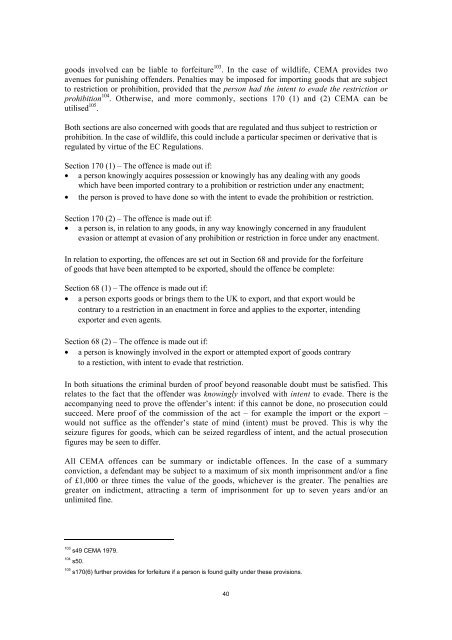
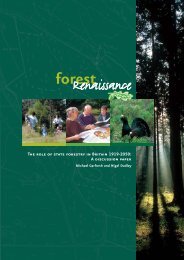
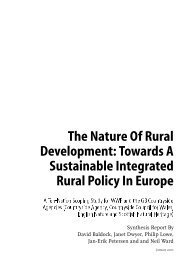
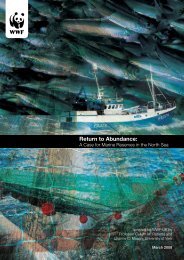

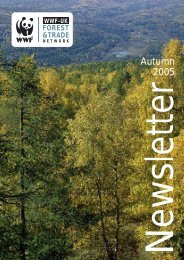
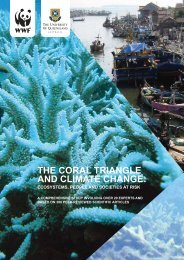

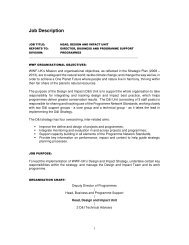
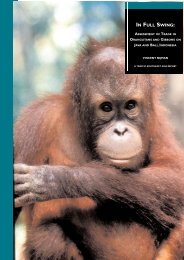
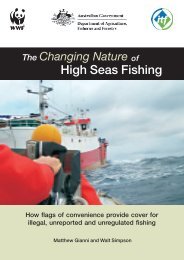
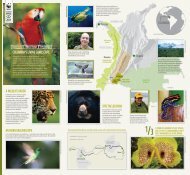
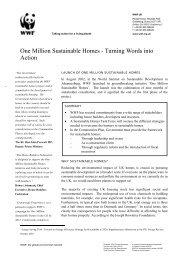
![[PDF] Causes for concern: chemicals and wildlife - WWF UK](https://img.yumpu.com/31929970/1/184x260/pdf-causes-for-concern-chemicals-and-wildlife-wwf-uk.jpg?quality=85)
